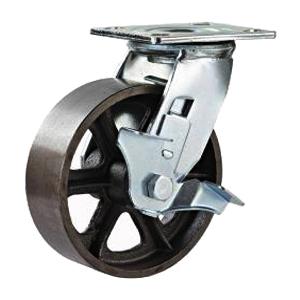Heavy Duty Caster Wheels

Description:
Wheel Material: Cast iron wheelsSize:4'' x 50mm ; 5'' x 50mm ; 6'' x 50mm ; 8'' x 50mm
Loading Capacity:250kg-500kg
Bearing Type:Double Ball Bearing
Type Optional: Plate Swivel,Rigid
Widely used as movable racks caster,conveyor caster,utility trucks caster,storage racks caster,scaffold caster,foot stand caster
| Caster No. | Wheel | Material | Bearing | Plate | Mount | Height | Hole Dia | Thread | Stem | Loading |
| CICSSB-4 | 100x 50 | Cast Iron | Roller | 114 x 100 | 84 x 71 | 138 | 11 | / | / | 250 kg |
| CICSSB-5 | 125 x 50 | Cast Iron | Roller | 114 x 100 | 84 x 71 | 160 | 11 | / | / | 350 kg |
| CICSSB-6 | 150 x 50 | Cast Iron | Roller | 114 x 100 | 84 x 71 | 185 | 11 | / | / | 450 kg |
| CICSSB-8 | 200 x 50 | Cast Iron | Roller | 114 x 100 | 84 x 71 | 230 | 11 | / | / | 500 kg |
Iron Cast Castors offer many advantages for a range of applications. Cast iron is well-known for its strength and durability, which makes it an ideal material for use in caster wheels. In this article, we will explore the advantages of Iron Cast Castors in detail.
Strength and Durability
Cast iron is an incredibly strong and durable material that can handle heavy loads and withstand constant use over time. This makes it ideal for use in caster wheels, especially in applications where heavy loads are common. Iron Cast Castors can support high weight capacities, which makes them perfect for use in industrial settings where heavy machinery needs to be moved around.
High Heat Resistance
Cast iron is also known for its high heat resistance, which makes it a great choice for applications that involve exposure to high temperatures. Iron Cast Castors can withstand temperatures up to 350-400 degrees Celsius, which is higher than many other materials commonly used to make caster wheels. This makes Iron Cast Castors ideal for use in ovens, kilns, and other environments that require high heat resistance.
Low Rolling Resistance
Iron Cast Castors have a low rolling resistance, which means they are easier to move around than other types of caster wheels. This is because cast iron is very hard and has a smooth surface, which allows it to roll easily over a variety of surfaces. This is important in applications where caster wheels need to move around quickly without causing damage to the floor or other surfaces.
Longevity
Cast iron is a long-lasting material that can withstand constant use over time without becoming damaged or corroded. This makes Iron Cast Castors an ideal choice for applications where longevity is important, such as in industrial settings where heavy loads and constant use are common. Iron Cast Castors can last for many years, which can save money on replacement costs and reduce downtime.
Cost Effective
While cast iron may be more expensive than other materials commonly used to make caster wheels, its strength, durability, and longevity make it a cost-effective option in the long run. This is because Iron Cast Castors require less frequent replacement than other types of caster wheels, which can save money on replacement costs and reduce downtime. Additionally, Iron Cast Castors can help reduce the wear and tear on machinery and equipment, which can save money on repairs and maintenance.
Conclusion
Iron Cast Castors offer many advantages for a range of applications. They are strong, durable, heat-resistant, Additionally, they have a low rolling resistance, and are cost-effective in the long run. All of these factors make Iron Cast Castors an ideal choice for industrial settings and other applications that require heavy-duty caster wheels that can withstand constant use over time.

 English
English Spanish
Spanish German
German Russian
Russian Arabic
Arabic Portuguese
Portuguese Italian
Italian French
French Hebrew
Hebrew Turkish
Turkish